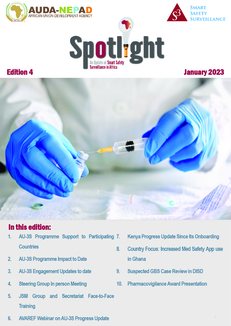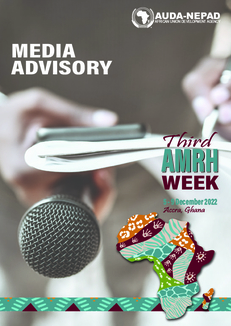We, the African Union (AU) Member States, the African Union Commission (AUC), the African Union Development Agency-NEPAD (AUDA-NEPAD), the World Food Programme (WFP), the United Nations Children's Fund (UNICEF), the Food and Agriculture Organization (FAO), the United Nations Educational, Scientific and Cultural Organization (UNESCO), as well as distinguished invitees,
RECALLING previous AU Assembly of Heads of State and Government declarations and decisions on home-grown school feeding that recognise its contributions to improving access to education and learning outcomes, and the positive impact it plays in strengthening local and rural economies and food systems as a means of tackling malnutrition and improving livelihoods. Assembly Decision 589 (XXVI) adopted at the Assembly's 26th Ordinary Session held on 30-31 January 2016 in Addis Ababa, Ethiopia and the Malabo Declaration on Accelerated Growth and Transformation adopted at the Assembly's 23rd Ordinary Session held on 26-27 June 2014 in Malabo, Equatorial Guinea;
REAFFIRMING our commitment towards advancing the school feeding agenda, particularly home-grown-school feeding that can serve as a critical safety net and multi-sectoral delivery platform, providing multiple benefits for school-age children, smallholder farmers and communities;
BEARING IN MIND that the 2021 continental commemoration of the African Day of School Feeding is an opportunity to raise awareness on its importance and to renew past AU commitments on school feeding and its complementary benefits and contributions;
AWARE that the 2021 African Day of School Feeding is commemorated under the theme "Harnessing Africa's Traditional Knowledge and Food to Support Sustainable School Feeding Programmes and Systems During COVID-19 Response and Beyond", owing to this year's African Union theme - Year of the Arts, Culture and Heritage - and in light of COVID-19 pandemic;
TAKING COGNISANCE of the Communiqué of the 11th Africa Day for Food and Nutrition Security dated 30th October 2020, that among others, recommends that AU Member States and their Development Partners place special emphasis on promoting indigenous and neglected food crops to deliver healthier diets on the continent;
TAKING NOTE of the African Union Biennial Report on Home-Grown School Feeding (2019-2020);
APPRECIATING the information presented during discussions from Ministers responsible for Education and Agriculture and subject matter experts on school feeding, health and nutrition, education, social protection and agriculture;
RECOGNISING that school feeding serves as a game-changing intervention for children (girls in particular) who benefit from being healthier and better educated, for farmers who benefit from enhanced access to more stable markets, for women (especially those with micro, small and medium-sized businesses) who benefit from providing services to school feeding programmes, and for local communities and nations who benefit from enhanced human capital and improved socio-economic development, thereby contributing to the realisation of Agenda 2063 – The Africa We Want;
NOTING WITH SATISFACTION the strides made by Member States to translate AU Assembly Decision 589 (XXVI) into their national policy frameworks, with 27 Member States having in place a national school feeding policy as of 2019 up from 8 Member States in 2013;
Click here to read more
For information: Kefilwe Moalosi, contact: kefilwem@nepad.org




